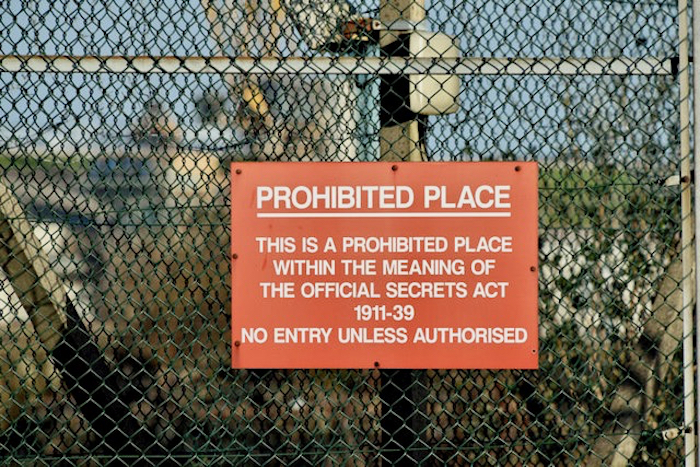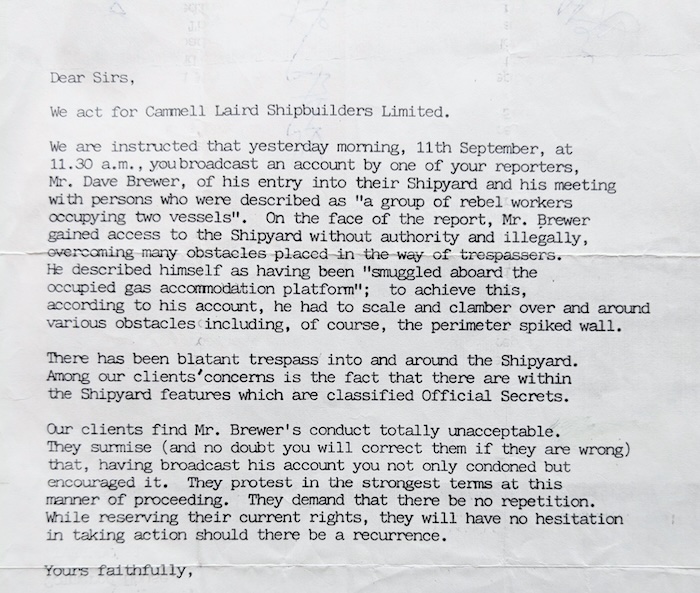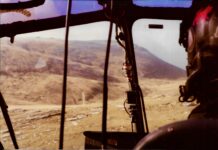
In this scenario we look at a situation where a journalist is faced with breaking the law in order to gather essential information for informing the public debate.
You are a radio reporter in a maritime city where shipbuilding is a major source of employment and wealth.
The local shipyard has announced 800 job losses on top of 800 announced a few months earlier.
In an effort to save their jobs, 37 workers decide to occupy a gas accommodation platform and a frigate, which are moored in the river adjacent to the shipyard.
Their protest has been going on for almost 14 weeks. Police and pickets surround the gates of the yard and the ramps leading to the occupied vessels.
For more than three months local media has received news releases and statements from the shipyard management, politicians, and from the union representing the occupying workers – but nobody has heard directly from the workers taking the action.
The only contact with them is via handwritten notes which are smuggled off one of the vessels, the gas accommodation platform, by messengers who, under the cover of darkness, dodge the police lines and use ropes to swing over barbed fencing and across the water between the accommodation platform and the shore, and then scramble aboard with the help of the occupying workers.
One morning, speaking live on your radio station, the union representative claims that management has turned off the water supply in an effort to end the occupation.
The representative says conditions on the occupied accommodation platform are bad and that some of the occupying workers are unwell. Their families express concern on your radio station’s morning phone-in. Many are distressed.
You have been reporting events since the start, and one obvious angle not yet covered is what life is like on the occupied platform. You have heard second-hand, but feel it’s important that you see for yourself the living conditions of the striking workers so that you can report the situation accurately.
Your news editor agrees, and it’s decided that you should try to board and interview the men. You know you will be trespassing, and could face legal action, but you go ahead anyway.
You meet union representatives on the quay next to the rig at 2am and, with the help of a rope thrown down by the occupying workers, scramble aboard. You are carrying a small transmitter called a ‘Cubi’ (these are the days before mobile phones were common). You also carry a tape recorder.
For the next few hours you talk to the occupying workers and record interviews. At 11:30am you broadcast live in the mid-morning news and current affairs programme including interviews you had recorded earlier.
After broadcasting your report, your radio station receives a phone call from the shipyard’s management threatening legal action unless you leave the platform immediately. The following day a letter from their lawyers warns against any further attempt to gain access to the vessel and interview the occupying workers.

Questions
- Is it ever right to defy the law in order to gain access to information?
- Should the radio station apologise to the shipyard management for the trespass?
- Should the radio station continue to use the material gathered during the trespass?
- Or should the radio station management instruct reporters to leave the story alone for fear of the shipyard taking legal action?
- Does the editorial motivation to get the whole story replace your duty of care to those whose words you broadcast?
- Is trespassing in order to talk to those occupying the vessel in the public interest?
Suggested responses
As journalists we will frequently face obstacles when news-gathering.
Public relations and communications officers will always be happy to feed you the side of the story that suits their needs. This is their job.
However, it is not always that easy to explore, understand, and articulate those elements of the story that are hidden behind legal barriers.
And, without all the facts, it’s difficult to relay a complete version of events to your audience.
Journalists need to be able to paint the fullest picture possible of what is really happening, without putting themselves, or those they are interviewing, in harm’s way.
In this particular case the decision to trespass in order to talk to the occupying workers face-to-face, and to see first-hand the conditions they were living under, was taken on editorial grounds after careful consideration by senior editorial staff.
Together, they decided the risk of arrest for trespass was worth taking in return for hearing a perspective on a major local news story that, for 14 weeks, had not been told.
One major consideration was whether scrambling on to the occupied rig to hear from the occupying workers was in the public interest.
So it’s important always to refer up to your line manager in all cases where you feel you need to take actions that could be legally dangerous.
Your line manager will need to decide whether the information you hope to gather is in the public interest, and your organisation’s legal team will assess the risk to you and to the company.
Summing up
This text describes a situation where a local shipyard’s significant job losses have led to a 14-week occupation of a gas accommodation platform and frigate by 37 workers. The workers are protesting the job losses, but their voices have been largely unheard, with communication limited to smuggled handwritten notes. A radio reporter, aware of the lack of direct information and concerned about the workers’ well-being (especially after allegations of the water supply being cut off), decides to board the occupied platform to interview them and report on their living conditions. This action, while potentially illegal trespass, is deemed necessary by the reporter and their editor to provide a complete and accurate account of the situation to the public. The text then raises ethical questions about defying the law for information, the station’s responsibility, and the balance between editorial drive and duty of care.

This scenario presents a classic ethical dilemma faced by journalists: the conflict between upholding the law and fulfilling the public’s right to know.
Key elements:
- Public Interest:
- The shipyard’s job losses have a significant impact on the community, creating a strong public interest in understanding the situation.
- The workers’ occupation, their conditions, and the alleged management actions all contribute to this public interest.
- Lack of direct information:
- For months, the public has received information from limited sources (management, politicians, unions).
- The perspectives of the occupying workforce – the heart of the story – remains unheard.
- Humanitarian concerns:
- The workers’ alleged lack of water and deteriorating health raise serious humanitarian concerns.
- These are important considerations which, unless checked cannot be confirmed.
- Journalistic duty:
- The reporter feels a strong obligation to provide accurate and firsthand information about the workers’ living conditions.
- This is a local story involving local residents being covered by a local reporter working for a local radio station. The journalist’s role is to inform that audience with accurate and reliable information.
- Legal risk:
- The reporter and the radio station are aware that boarding the occupied platform constitutes trespassing and could lead to legal action.
- It is a decision not taken lightly and is the result of the reporter having first ‘referred up’ to ensure that senior editors approved of the action.
- The power of first hand reporting:
- The first hand reporting allows the public to make a more informed decision.
Analysis:
- The scenario highlights the limitations of relying solely on official sources or press releases. Sometimes, journalists must take risks to uncover the truth and provide a balanced perspective.
- The reporter’s decision to board the platform, while legally questionable, is driven by a desire to fulfil the core journalistic function of informing the public.
- The use of a hidden transmitter and tape recorder emphasises the need for journalists to be resourceful and innovative in gathering information.
- The reaction from the shipyard management shows the tension between the press and powerful organisations.
- The fact that the information was broadcast live, shows the urgency of the situation.
- The use of the radio phone in by the families, shows the power of the radio medium to give a voice to those who would not normally have one.
Issues:
- Ethical considerations:
- This scenario forces us to consider the ethical boundaries of journalism.
- Is it ever justifiable to break the law in the pursuit of truth?
- How does one balance the public’s right to know with legal obligations?
- The importance of unbiased reporting:
- The scenario underscores the importance of seeking out diverse perspectives and avoiding reliance on biased (or one-sided) sources.
- Multiple perspectives are important when covering any news story.
- The role of journalism in holding power accountable:
- By exposing the workers’ living conditions and the alleged management actions, the reporter is acting as a watchdog, holding those in power accountable.
- This is a fundamental role of journalism.
- The power of radio:
- In a time before wide spread mobile phone usage, radio was a powerful tool in getting information out to the public.
This scenario presents a complex ethical and legal dilemma faced by a journalist. The reporter’s decision to break the law is driven by a strong sense of public duty and a desire to provide accurate and firsthand information. The scenario highlights the importance of unbiased reporting, the ethical considerations involved in journalism, and the role of the media in holding power accountable. It also shows the power of radio as a medium for communicating information quickly and efficiently.








